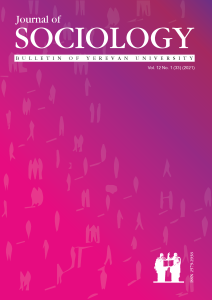The Internationalization of Higher Education in Armenia Nowadays the Analysis of the Existing Problems
DOI:
https://doi.org/10.46991/BYSU:F/2021.12.1.079Keywords:
higher education, internationalization, Bologna process, national educational system, human capital, academic mobilityAbstract
Internationalization is a rapidly growing trend among the higher education system around the world. Academic and research institutions demonstrate a growing interest in the processes of internationalization of higher education, at the international, regional, national, and institutional levels. Internationalization and global engagement are becoming key trends in the development of national systems of education in Armenia and abroad. Numerous researchers have highlighted the problematics of internationalization of higher education associated with the cultural impact of university education, a synergy of humanitarian and natural sciences, intercultural communication, digital and blended learning, international credit and degree mobility, the introduction of international standards for measuring the quality of education defined by the Bologna Declaration. Although internationalization has become established in education at the international level, it should be realized that at the moment there is no single policy or strategy for the internationalization of the higher education system in Armenia, both at the regional and national levels. The lack of uniform strategy is in some way offset at the institutional level: the increasing number of Armenian higher education institutions have integrated internationalization, to varying degrees, in their mission and vision. It can be seen in the activities of the leading universities in Armenia. The global knowledge economy requires all universities to be the competitors for students, faculties, strategic partnerships, and research funding, as well as to prepare their graduates to be global professionals, scholars, highly demanded and competitive. Indicating the mechanism of the implementation of an international component into the existing curricula, programs, research, teaching, and learning processes may contribute to the understanding of the process of internationalization of higher education. Thus, more research is needed on the experience of Armenia and other countries in implementing the provisions of the Bologna process. The purpose of this article is to examine the theoretical and practical aspects of the internationalization process, identifying some challenges and obstacles for the Armenian higher education system and presenting possible ways of overcoming them.
References
Knight, J. (2004). Internationalization Remodeled: Definition, Approaches, and Rationales. Journal of Studies in International Education. Vol. 8. 5-31. Doi: https://doi.org/10.1177/1028315303260832
Knight, J. (1994). Internationalization: Elements and Checkpoints. CBIE Research No. 7. Canadian Bureau for International Education (CBIE).Bureau canadien de l’éducation internationale (BCEI). 220 Laurier Avenue West, Suite 1550, Ottawa, Ontario K1P 5Z9
Castells, M. (1996). The Rise of The Network Society. Oxford: Blackwell Publishers
Knight, J. (2003). Updating the Definition of Internationalization. International Higher Education. The Boston College Center for International Higher Education, 2-3
Altbach, Ph. (2013). The International Imperative in Higher Education. Global Perspectives of Higher Education. Sense Publishers. Vol. 27. 194. Doi: https://doi.org/10.1007/978-94-6209-338-6
Farrugia, C. (2013). Education abroad: Moving out of the classroom and into the real world. Retrived from http://www.iie.org/Blog/2013/August/EducationAbroad-Moving-Out-Of-The-Classroom.
Bedenlier, S. (2017). Internationalization within higher education and its influence on faculty: experiences of Turkish academic staff. Journal of Research in International Education. Vol. 16(2), 185 – 196. Doi: https://doi.org/10.1177/1475240917724272
Krosnoshchekov, V.V. (2017). Vsestoronnyaya internacionalizaciya i drugie tendencii, vliyayushchie na kachestvo vysshego obrazovaniya. Mejdunarodnyi jyrnal eksperimental'nogo obrazovaniya. No 6, 43-46
Downloads
Published
How to Cite
Issue
Section
License
Copyright (c) 2021 Yevgine Aperyan

This work is licensed under a Creative Commons Attribution-NonCommercial 4.0 International License.








